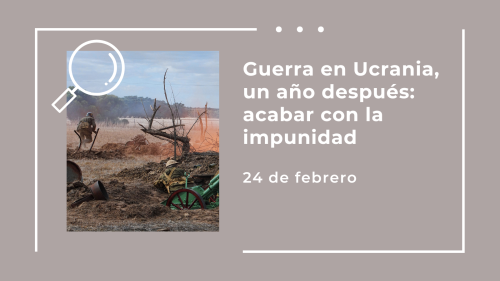
War in Ukraine, one year on: ending impunity
On February 24, 2022 Russia invaded Ukraine in contravention of the basic principles of international humanitarian law and international human rights law.
During these twelve months, the conflict claimed the lives of 8006 civilians and wounded 13,287, displacing 14 million people from their homes and leaving nearly 18 million people in dire need, as highlighted this week by the UN High Commissioner for Human RightsVolker Türk.
Several reports as well as the investigation carried out by the United Nations Independent International Commission of Inquiry on Ukraine have denounced forced relocations, torture, murder of civilians, brutal executions, cases of gender-based sexual violence, including against minors.
These atrocities have triggered unprecedented efforts in the fight against impunity.
Within the framework of a procedure raised by Ukraine a few days after the Russian invasion and based on the controversy in the interpretation and application of the Convention on the Prevention and Punishment of the Crime of Genocidethe International Court of Justice (ICJ), the principal judicial organ of the United Nations Organization, issued three judgments on the provisional measures urging Russia to immediately suspend military operations, as well as to ensure that its armed units do not promote such operations, requesting both parties to renounce any action that could aggravate the dispute before the Court, in which, it should be noted, several States – among them España – have each filed a statement of intervention.
Unfortunately, while the three measures were seen around the world as vindication of the Ukrainian cause, the court lacks the means to ensure their enforcement.
For its part, the Office of the Prosecutor of the International Criminal Court (ICC) decided to open an investigation into the situation in Ukraine, at the request of 39 member countries of the Rome Statute. In addition, it sent an in-country forensic and investigative team-the largest field deployment ever sent by the ICC to a country-with the aim of contributing to the collection of evidence by strengthening cooperation with local authorities in Ukraine.
Despite the fact that neither Ukraine nor Russia is a state party to the Rome Statute, Ukraine has already in 2014 twice exercised its prerogatives to legally accept the jurisdiction of the Court over alleged crimes under the Rome Statute occurring on its territory, should the Court decide to exercise such jurisdiction.
Therefore, the Court has, in principle, jurisdiction over all crimes under the Rome Statute. committed on the national territory of Ukraine since November 21, 2013, with the exception of the crime of aggression (for legal reasons); on the latter the ICC can exercise its jurisdiction only if the UN Security Council refers a corresponding situation to it (art. 15ter), which is impossible due to the veto power Russia has as a permanent member, or if both the aggressor State, and the victim State, are States Parties (art. 15bis (4), (5)).
In response to the ICC’s jurisdictional limits, Ukrainian President Vlodomir Zelensky proposed in September 2022 the creation of an ad hoc international tribunal to prosecute high-ranking Russian officials for an alleged crime of aggression. This proposal has been well received by the international community, with the explicit support of the European Union. The main problem with this option is that according to Chapter VII of the UN Charter, the creation of such tribunals requires a resolution of the UN General Assembly. Security CouncilThe Russian veto power is once again a difficult obstacle to overcome.
In addition, the European Union Agency for Criminal Justice Cooperation (EUROJUST) supported Lithuania, Poland and Ukraine in setting up a Joint Investigation Team(JIT) on March 25, 2022. The team has since been joined by Estonia, Lithuania, Slovakia and Romania, as well as the ICC prosecutor’s office. Eurojust coordinates and assists national authorities in the investigation and collection of evidence of crimes. In addition, the participation of civil society organizations has been encouraged in this process, as they are considered, in the words of prosecutor Karim A.A. Khan, “essential partners in our common goal of achieving accountability for international crimes”.
On the other hand, the United Nations Human Rights Council adopted on March 4, 2022 the RES 49/1The Commission of Inquiry, which established the independent Commission of Inquiry with a mandate to investigate and gather evidence of alleged violations of human rights and international humanitarian law in Ukraine. On October 18, 2022, the commission issued a report concluding that war crimes and violations of human rights and international humanitarian law have been committed in Ukraine, the vast majority of these acts being attributable to the Russian armed forces.
Finally, universal jurisdiction would be another avenue for prosecuting these international crimes. In this regard, several countries, including Switzerland, have set up units to gather evidence – mainly from refugee testimonies – for possible future trials in national or international courts.
While attempts to punish Russia’s violations of international law are not without structural difficulties, it goes without saying that efforts must be pooled to overcome these obstacles and exhaust all possibilities for the purpose of seeking justice and combating impunity.
Adolfo Labajos, FIBGAR collaborator.
Madrid, February 24, 2023.



